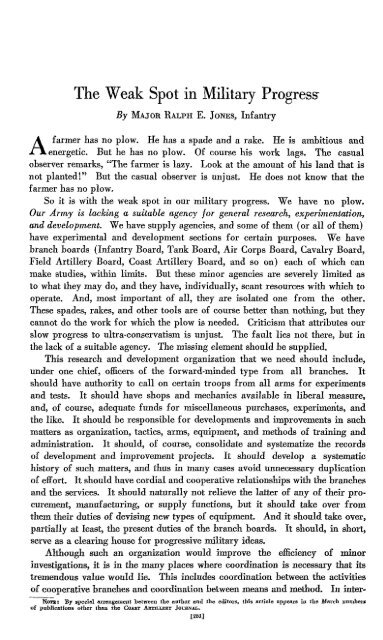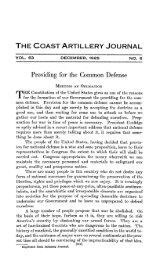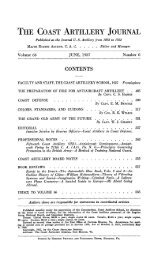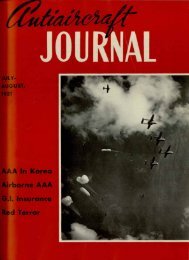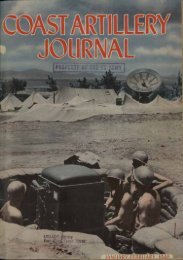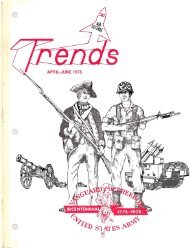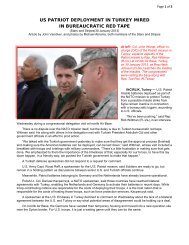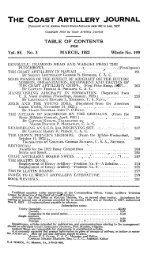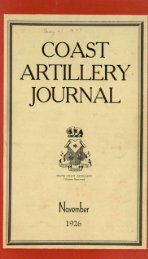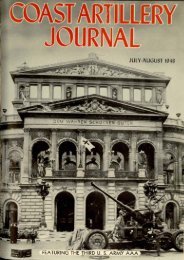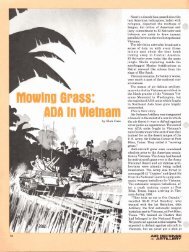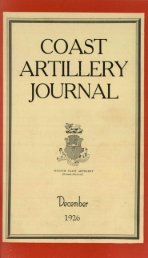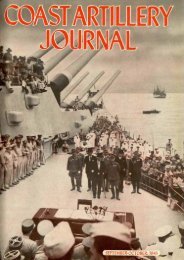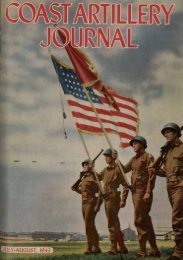THE COAST ARTILLERY JOURNAL - Air Defense Artillery
THE COAST ARTILLERY JOURNAL - Air Defense Artillery
THE COAST ARTILLERY JOURNAL - Air Defense Artillery
You also want an ePaper? Increase the reach of your titles
YUMPU automatically turns print PDFs into web optimized ePapers that Google loves.
The Weak Spot in Military Progress<br />
By MAJOR RALPH E. JONES, Infantry<br />
A<br />
farmer has no plow. He has a spade and a rake. He is ambitious and<br />
energetic. But he has no plow. Of course his work lags. The casual<br />
observer remarks, "The farmer is lazy. Look at the amount of his land that is<br />
not planted!" But the casual observer is unjust. He does not know that the<br />
farmer has no plow.<br />
So it is with the weak spot in our military progress. We have no plow.<br />
Our Army is lacking a suitable agency for general research, experimentation,<br />
and development. We have supply agencies, and some of them (or all of them)<br />
have experimental and development sections for certain purposes. We have<br />
branch boards (Infantry Board, Tank Board, <strong>Air</strong> Corps Board, Cavalry Board,<br />
Field <strong>Artillery</strong> Board, Coast <strong>Artillery</strong> Board, and so on) each of which can<br />
make studies, within limits. But these minor agencies are severely limited as<br />
to what they may do, and they have, individually, scant resources with which to<br />
operate. And, most important of all, they are isolated one from the other.<br />
These spades, rakes, and other tools are of course better than nothing, but they<br />
cannot do the work for which the plow is needed. Criticism that attributes our<br />
slow progress to ultra-conservatism is unjust. The fault lies not there, but in<br />
the lack of a suitable agency. The missing element should be supplied.<br />
This research and development organization that we need should include,<br />
under one chief, officers of the forward-minded type from all branches. It<br />
should have authority to call on certain troops from all arms for experiments<br />
and tests. It should have shops and mechanics available in liberal measure,<br />
and, of course, adequate funds for miscellaneous purchases, experiments, and<br />
the like. It should be responsible for developments and improvements in such<br />
matters as organization, tactics, arms, equipment, and methods of training and<br />
administration. It should, of course, consolidate and systematize the records<br />
of development and improvement projects. It should develop a systematic<br />
history of such matters, and thus in many cases avoid unnecessary duplication<br />
of effort. It should have cordial and cooperative relationships with the branches<br />
and the services. It should naturally not relieve the latter of any of their procurement,<br />
manufacturing, or supply functions, but it should take over from<br />
them their duties of devising new types of equipment. And it should take over,<br />
partially at least, the present duties of the hranch boards.<br />
serve as a clearing house for progressive military ideas.<br />
It should, in short,<br />
Although such an organization would improve the efficiency of minor<br />
investigations, it is in the many places where coordination is necessary that its<br />
tremendous value would lie. This includes coordination hetween the activities<br />
of cooperative hranches and coordination between means and method. In inter-<br />
~: By special llI1"aIlgement between the a.uthor and the editors,. this article a.ppears in the March numbers<br />
of publications other than the <strong>COAST</strong> <strong>ARTILLERY</strong> JOCBNAL ..<br />
[261J


